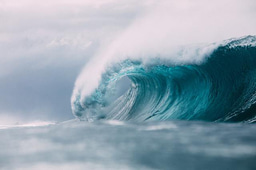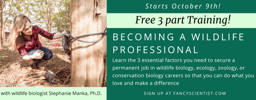Capacity development in nature conservation: New approaches to strengthen individual professionals
I hope you enjoyed the above video, it was a humbling process of transforming 65,000 words in a few animation slides using a ‘clay explainer’ (I love this term!). My PhD journey started in 2015 when I had been working in conservation practice in Indonesia for a couple years and I asked my seniors in the field: “Where are the best practices on capacity development in conservation?” Ironically, they answered that they did not have the capacity to look at capacity. So I designed a PhD proposal to do just that.
The story behind this PhD
Initially, I tried to take a more focused approach, i.e. looking at the professional development of conservationists. Of course, as all of you know who have worked on a project that lasted several years, nothing turns out the way you plan it. I did look at professional development, but after interviewing 22 inspiring conservationists I discovered that there is much more to capacity development than that. It’s also about sustaining our capacity through time, to improve it, even when things get tough. Many of us conservationists know what such challenging situations can look like, e.g. dangerous encounters with wildlife, poachers, and rebels. Equally, there are often emotionally and cognitively demanding aspects of our work, including collaborating with different groups who hold conflicting interests, and the complexity of mitigating drivers of biodiversity loss from a local to global scale. Do you feel you could benefit from a bit more TLC in your life? Read on :)
"I think that the biggest issue for me is to think about what is feasible and manageable for yourself. The more important thing is to do well at the scale that works for you. And then connect that to other people who are working on that scale and collectively you can have a bigger impact’ (Respondent 16, quote from Loffeld et al. 2022: 6).
A celebration & thank you
I am really grateful to everyone who has been part of my PhD journey, who has actively supported me: my interviewees, my survey participants, PhD supervisors at DICE @Tatyana Humle , @Simon Black , @Bob Smith , my external supervisors @SUSAN CHEYNE and @Madhu Rao, my co-authors@Marianne Carter and @Eleanor Sterling and of course my lovely PhD peers. As well as those who have given me the best work-life environment to thrive (e.g. the many home-cooked meals from friends and family).
To celebrate I also wanted to share with you some of the fruits of this labour because one of my PhD chapters got “freshly published” today! This chapter builds on the insights of my 22 interviewees: how do we as conservationists persevere in our work? What gives us energy and what drains our energy? How can we build up our personal resilience strategies? A huge thank you to my participants for your openness and honesty in which you all shared your career journey and many experiences with me: the good, the bad & the ugly!
Please find the free download of this open access article titled “What makes conservationists persevere? Resilience strategies at work” here. I would also recommend having a look at the supplementary materials for additional insightful interviewees’ quotes, like the one below. I would be interested to hear if you, as our WildHub community member, recognise any of the situations they describe; please let me know by adding your comments below, which will help me whilst I continue this work. Thank you for supporting this work by sharing it widely within your networks! Also, follow me on WildHub to stay tuned on the publications of my other thesis chapters (including the survey results based on 600 respondents in the animation :)
"I feel love and passion for nature; it gives you motivation. [...] That's why if something happens, at least you have your belief in the cause" (interviewee quote, Loffeld et al. 2022: supplementary table 2)





Please sign in or register for FREE
If you are a registered user on WildHub, please sign in
Congrats and thanks for sharing, Thirza!
You're most welcome, Flavia! The social support factor was something that came up strongly in my PhD results to be important when we try to maintain and improve our energy levels at work. Your support to me and the wider WildHub community has definitely made a positive difference in my energy, motivation and wellbeing! Thank you for that.
This animation is absolutely fantastic- thanks for putting it out there Thirza- its a really excellent summary of some simple guidelines for enabling happy effective conservation professionals!
Many thanks for your positive feedback, Marianne! Would be great if you can share it with your networks. Wonderful also to have collaborated with you on the resilience paper, I am really happy that it's finally been published.
brilliant animation and communication of what must have been a comlex, detailed analysis.
Thanks Adam, I appreciate your positive feedback. Indeed, it was a complex & detailed analysis (e.g. using a combination of thematic analysis and structural equation modelling (SEM)); the corresponding SEM paper will be published in the future so stay tuned!
Thanks for sharing! I love the animation; it's a creative and visually appealing way to share information.
Thanks, Lara - lovely to read your positive feedback!
This is fantastic! Congratulations on such a great achievement and also on making it so visually appealing and easy to understand. I'd be happy to share it!
Thanks, Susan! It was a really great experience to have so much input from different conservationists across the globe on these topics and to see how passionately people spoke about motivation and wellbeing in the workplace. Thank you for sharing it with your network, much appreciated! PS there is a share button just next to the like button :)
I love this @Thirza Loffeld ! This animation is great, especially for someone like me who struggles with processing and reading a lot of text and is a visual learner! What an achievement for you and I'm so glad you shared it with all of us :)
Many thanks, Lize! I really enjoyed making this animation as well; it's such a creative and rewarding process. Happy to hear that it contributes to making it more accessible to all.